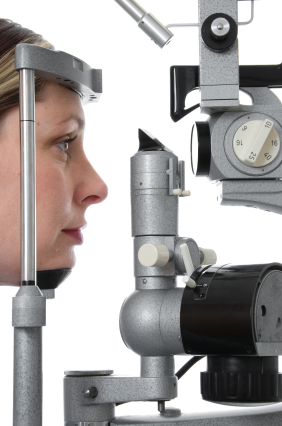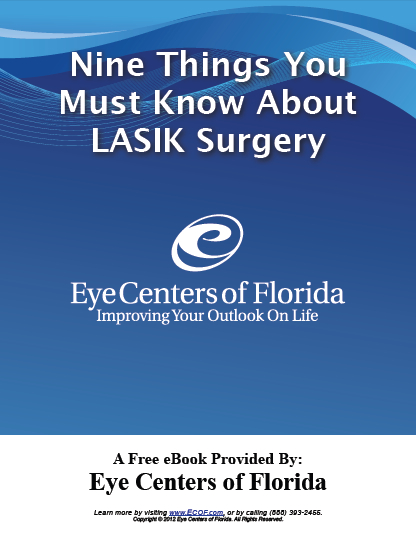Posted by: Eye Centers of Florida in Nine Things You Must Know About LASIK Surgery
3: Are You a Candidate for LASIK Surgery?

This is the third installment of Nine Things You Must Know About LASIK Surgery
Both nearsighted and farsighted people can benefit from the LASIK procedure. To decide whether you’re a good candidate for LASIK, your eye doctor will perform an eye exam to determine if your eyes are healthy enough for the procedure. They will also decide what type of vision correction you need.
Nearsightedness (Myopia) – If you are nearsighted, the goal is to flatten the too-steep cornea.
Farsightedness (Hyperopia) – If you are farsighted, a steeper cornea is desired.
Astigmatism – Excimer lasers also can correct astigmatism by smoothing an irregular cornea into a more normal shape.
Your doctor also will look for signs of dry eye disease, which must be treated and cleared up before LASIK can be performed. Even if your eyes have a normal tear film, your eye surgeon as a precaution may recommend treatment to reduce your risk of developing dry eyes after LASIK. Here are the typical requirements for LASIK surgery. If you meet these, you are most likely a candidate!
- You should be 20 years of age or more.
Eyes mature and develop at differing rates. The best LASIK candidates are at least 20 years of age. - You should have consistent, or “stable” vision.
Stable vision means your prescription has been the same for at least a year; two is better. Younger patients (under the age of 25) or those on certain medications may have fluctuating prescriptions. If this is the case, you should ask your doctor if you qualify, as it is determined on a case by case basis. - It is best if you are free of eye infections or injuries for a year or longer.
Infections such as Herpes of the eye, eye inflammation, dry eyes and corneal or retinal diseases may cause additional risks or complications. - You must be free of autoimmune disorders.
Many of these disorders affect wound healing. Examples include Lupus, Rheumatoid Arthritis and Multiple Sclerosis. - Patients should not take medications that exacerbate complications.
Certain medications, like Renova, steroids or immunosuppressants may prevent healing after LASIK surgery. Others, like Accutane, may promote dry eye syndrome. Any and all medications that a patient is taking or has taken in the recent past should be divulged to their doctor. - Your corneas cannot be scarred or abnormal.
The reshaping of the cornea may be affected if it is abnormal or scarred. There are many possible explanations for scarred or abnormal corneas: disease, trauma or aging. The most likely is Keratoconus, which is a disorder where the cornea eventually forms a rounded cone shape. The most likely causes of Keratoconus are: Inherited abnormality Eye injury Eye Disease, such as retinitis pigmentosa, retinopathy of prematurity, vernal keratoconjunctivitis Systemic diseases, such as Leber’s congenital amaurosis, Ehlers- Danlos Syndrome, Down’s syndrome, osteogenesis imperfecta, and Addison’s disease. - You should not be pregnant or nursing.
Hormonal changes in pregnant and nursing women many times affect vision stability. If you are considering pregnancy, talk openly with your surgeon about the possible timing and its ramifications. - Pupils must be of appropriate size.
Larger pupils may cause a LASIK candidate to experience glare, halos or starbursts after surgery. Alternative methods are available for these patients, such as LASEK or Epi-LASIK. - Have sufficient corneal thickness.
The surgeon needs to create a corneal flap; those with thin corneas (the transparent front of the eye) may not qualify. If the cornea is too thin, the surgeon may not be able to safely create the flap. There are additional alternative methods that can accommodate this problem.
- You should not have severe refractive errors.
LASIK surgery can not cure every refractive error. Patients with severe refractive errors should consider other procedures such as implantable collamer lenses. Consult with your doctor.
If you learn that you’re not a good candidate for LASIK and you’d like to learn more about implantable collamer lenses, visit the FAQ’s. Our state of the art eye surgery center is just one of the many ways that we work to provide the finest services and facilities for our patients. Genuine care and patient satisfaction is our highest mission. Whether you need surgery for: nearsightedness, farsightedness, astigmatism, cataracts, glaucoma, or any other vision needs contact us online or call (239) 939-3456 today!
– Karyl
